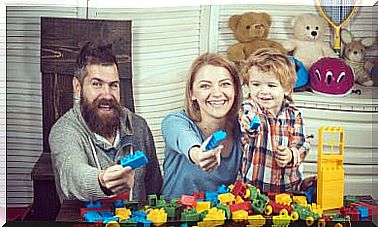Setting Boundaries For 2-year-olds Creates Responsible Adults

It is not easy to set boundaries for a 2-year-old. It is normal for children to want to be independent and go for what they want at that age. In addition, they believe that outbursts of anger can help them get what they want. Therefore, it is important to try to stay calm and controlled.
When parents establish rules and boundaries, they do so in part to keep their children from always getting what they want. In addition, they teach them to value and respect others.
So how do we move forward to be able to set boundaries? And what are the benefits?
Who is responsible for setting boundaries for a 2-year-old?
Both parents are responsible for setting boundaries for their children. Mom and dad must agree on the rules and inform the rest of the family so that the rules can be respected by everyone and thus enforced.
Therefore, think about each child’s abilities before choosing the rules to be established.
7 tips for setting boundaries for 2-year-olds
Boundaries are a must for children to learn how far they can go with their parents and other family members.
Below are some suggestions for things to keep in mind when setting your child’s rules:
1. A parent must give concrete and clear orders
Given that a 2-year-old cannot understand abstract messages , you should explain what behavior you expect from them. It is not enough to just say “tighten up” or “sit down”.
You need to be specific about what works and what exactly means right.

2. Speak clearly and calmly
If your child is behaving badly, explain what rule they are breaking. When doing so, be calm and use a serious tone.
Something that can be helpful is to write the rules and hang them in a place that is visible to everyone. Of course, you need to make use of visible representations of the rules so that your 2-year-old can better understand them.
If a child breaks a rule, it is good to remind him or her of the rules, but without shouting. It can otherwise lead to even worse behavior.
Do not give up, even if your child gets angry
Parents should be firm when the answer is NO, and not give in. Children are often prone to begging, crying or even getting outbreaks if they do not get what they want.
If your child succeeds in persuading you in this way, there is a high probability that it will continue in the future.
If you stick to what you say instead, your child will be more likely to respect the rules in the future.
4. Formulate your expectations positively
Children are more likely to obey orders that are expressed in a positive way. Instead of asking your child to stop crying, talk to him calmly.
For example, if your child beats another child, you should explain that he or she must treat others with love and respect instead of telling him or her not to fight.
Remember that your child is still developing their language skills and may not always understand the words “no” and “no”.
5. Think about your child’s personality
You have to keep the child’s personality in mind, because all children are different. Some need a mild warning while others need more rigor.
If your child does not obey the first time – continue until he does.
6. The parents must be a united front
If the mother forbids one thing, the father must back her in it and vice versa. Otherwise, the child will not learn to obey, but will instead go to the other parent.
It is confusing for the child and often leads to him not respecting any of the parents’ authority.
7. Create routines
Routines are extremely important for young children, so establish them early. If you set times for food and bedtime, it is important that you keep these times.
It will help your child know what is expected of him throughout the day.
If your child does not want to sleep, you should take him to bed and explain that tomorrow he will be tired if he does not get enough sleep.

The benefits of setting boundaries for a 2-year-old
There are several different benefits to setting boundaries for a 2-year-old, including the following:
- As your child grows, he learns to follow rules. It will be important during adolescence and adulthood.
- It teaches your child about responsibility.
- Your children will learn what behaviors and attitudes are expected of them, and they will get a sense of what is right and wrong.
- Learning to follow rules will help your child develop a positive self-confidence.
In conclusion, it is necessary to set limits for 2-year-olds in order to achieve obedience and responsibility. Although it seems complicated, it is important for the child’s development.
However, we hope that you have now noticed that it is much easier than you thought. Set boundaries for your child and he will thank you in the future.









